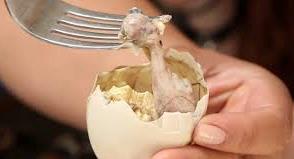U.S. in Danger of Foreign Animal Diseases and Plant Pests
|
07/23/2021 |
|
 According to a Department of Homeland Security report, agricultural specialists assigned to the U.S. Customs and Border Protection Service (US CBPS) have identified numerous attempts to illegally import consignments of plants and animals that could potentially introduce foreign animal diseases and pests. According to a Department of Homeland Security report, agricultural specialists assigned to the U.S. Customs and Border Protection Service (US CBPS) have identified numerous attempts to illegally import consignments of plants and animals that could potentially introduce foreign animal diseases and pests.
Among the 18,500 pounds of smuggled products intercepted in containers at International Falls, MN, were balut eggs. This Asiatic specialty effectively comprises 15 to 18-day incubated eggs that could potentially transmit avian influenza, exotic Newcastle disease or other pathogens to domestic flocks. Prohibited pork product destined for Asian food markets were also interdicted.
According to U.S. Customs and Border Protection, an attempt was made to import prohibited pork products through the Pembina point of entry in North Dakota.
|

Balut emryos.
A Philippine delicacy |
The issue of concern is the number of illegal importations of poultry and pork products that are not detected. Given statistic and projections of the discrepancy between apprehended and non-detected drug shipments, one can assume that despite vigilance, the sheer volume of imports will permit a high proportion of illegal items to enter the U.S. Since many of the items are destined for food distribution and consumption through Asian food markets, retail surveillance may be an important adjunct to border inspection. Operators of establishments should be required to provide proof that suspicious food products were in fact imported or acquired legally.
And now the Dominican Republic has cases of African Swine Fever and inevitably Haiti will follow given the long and porous border between the two countries. Will Cuba, 50 miles from Haiti at the nearest point be far behind?
|

|
|
|